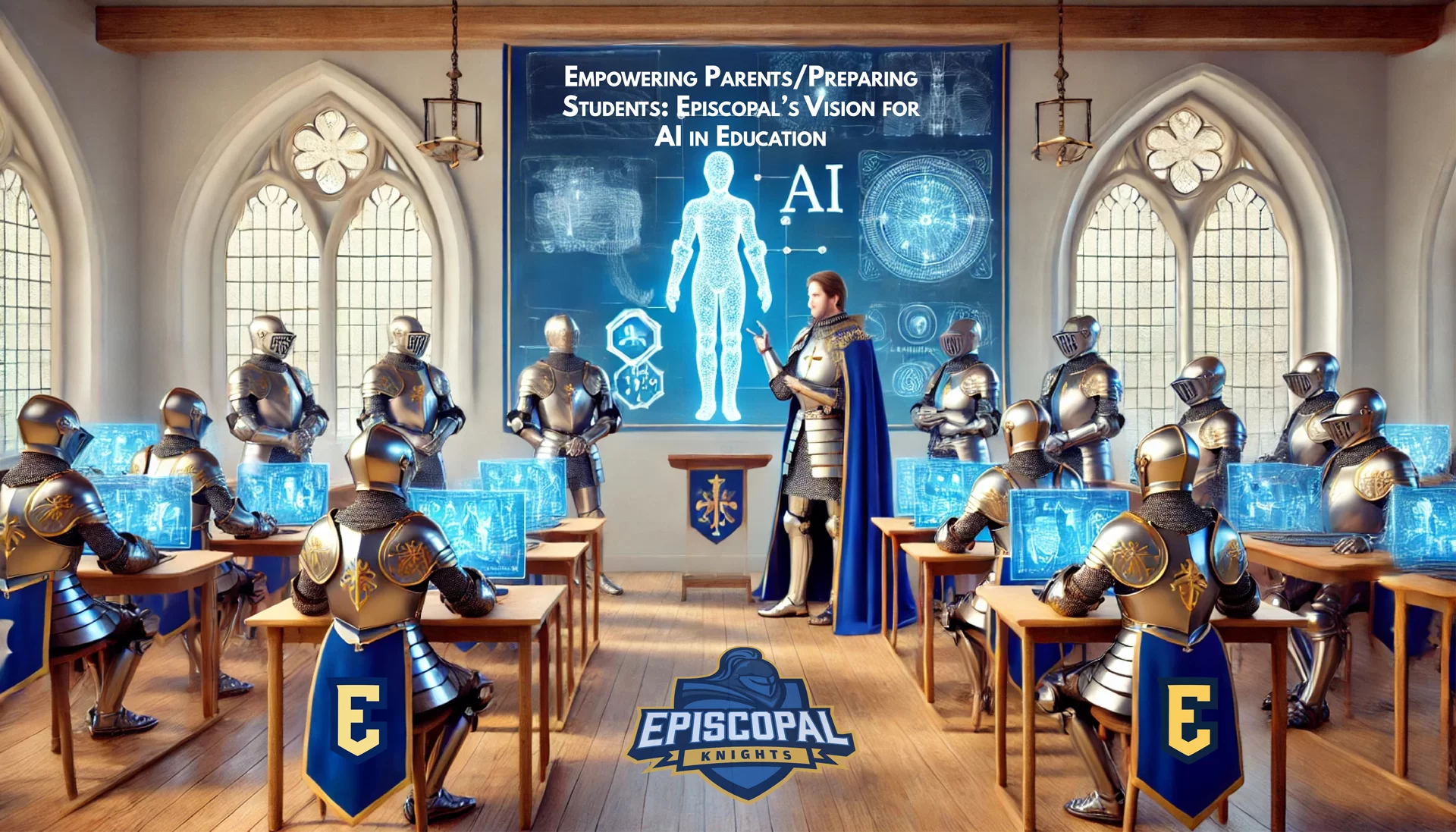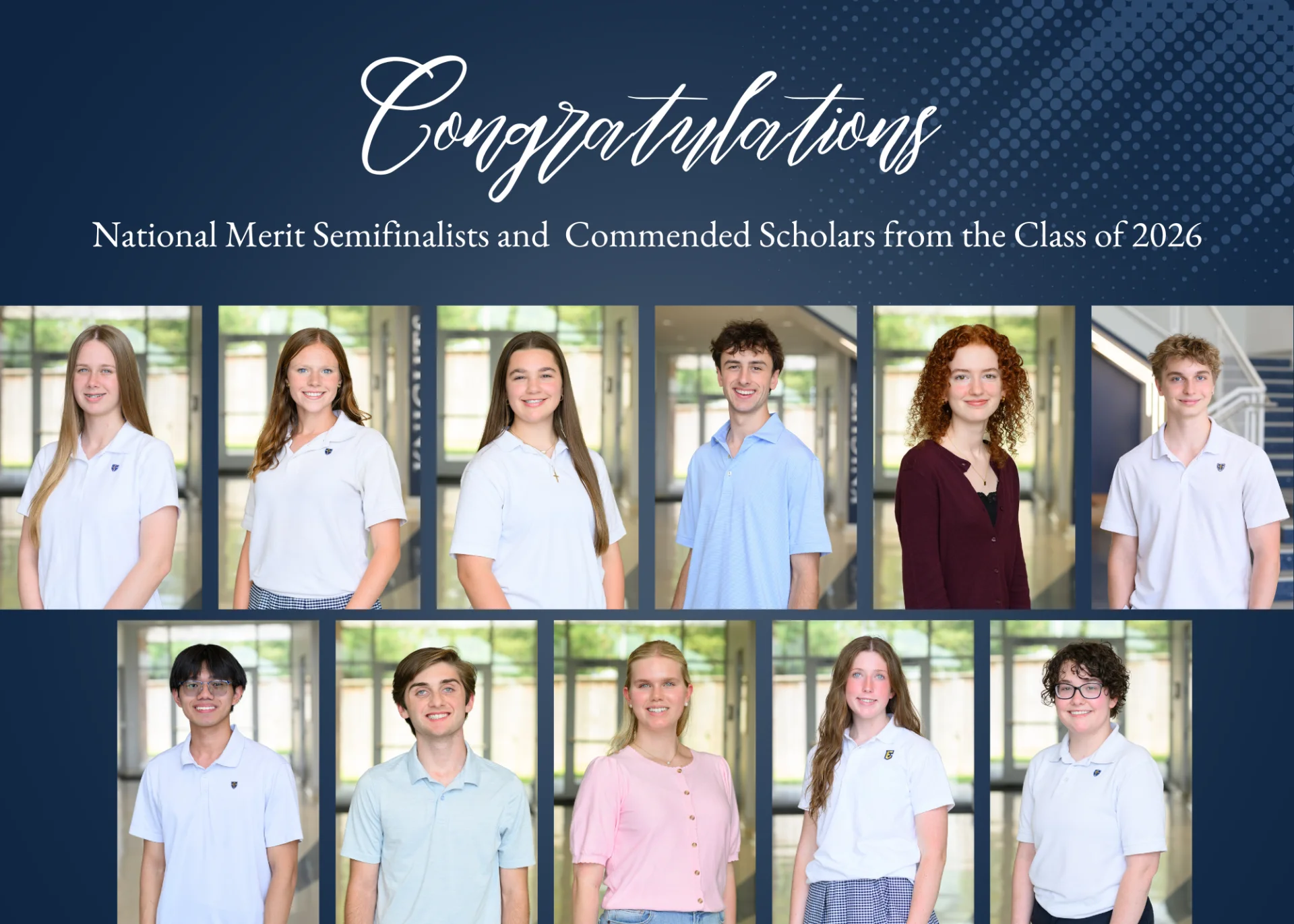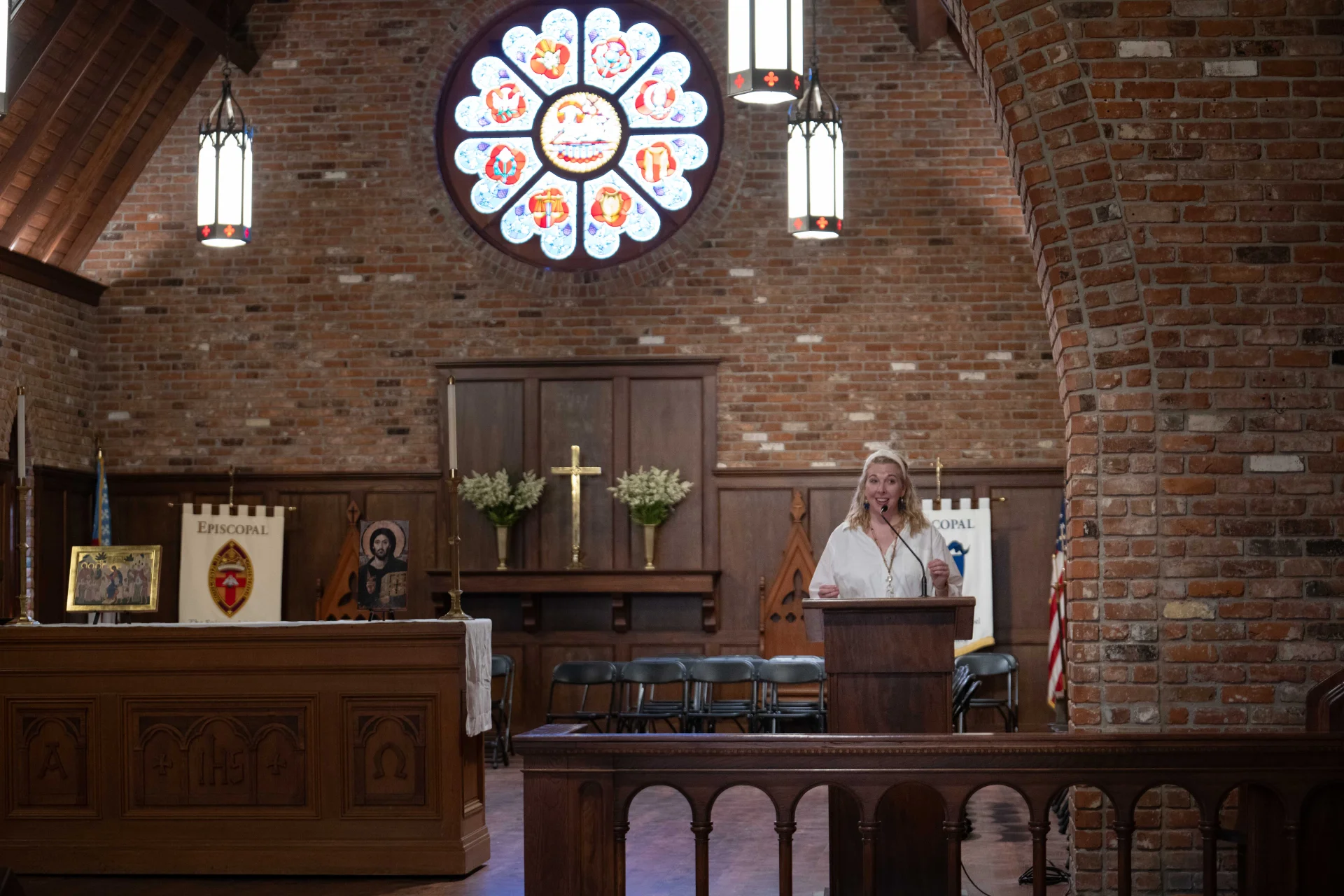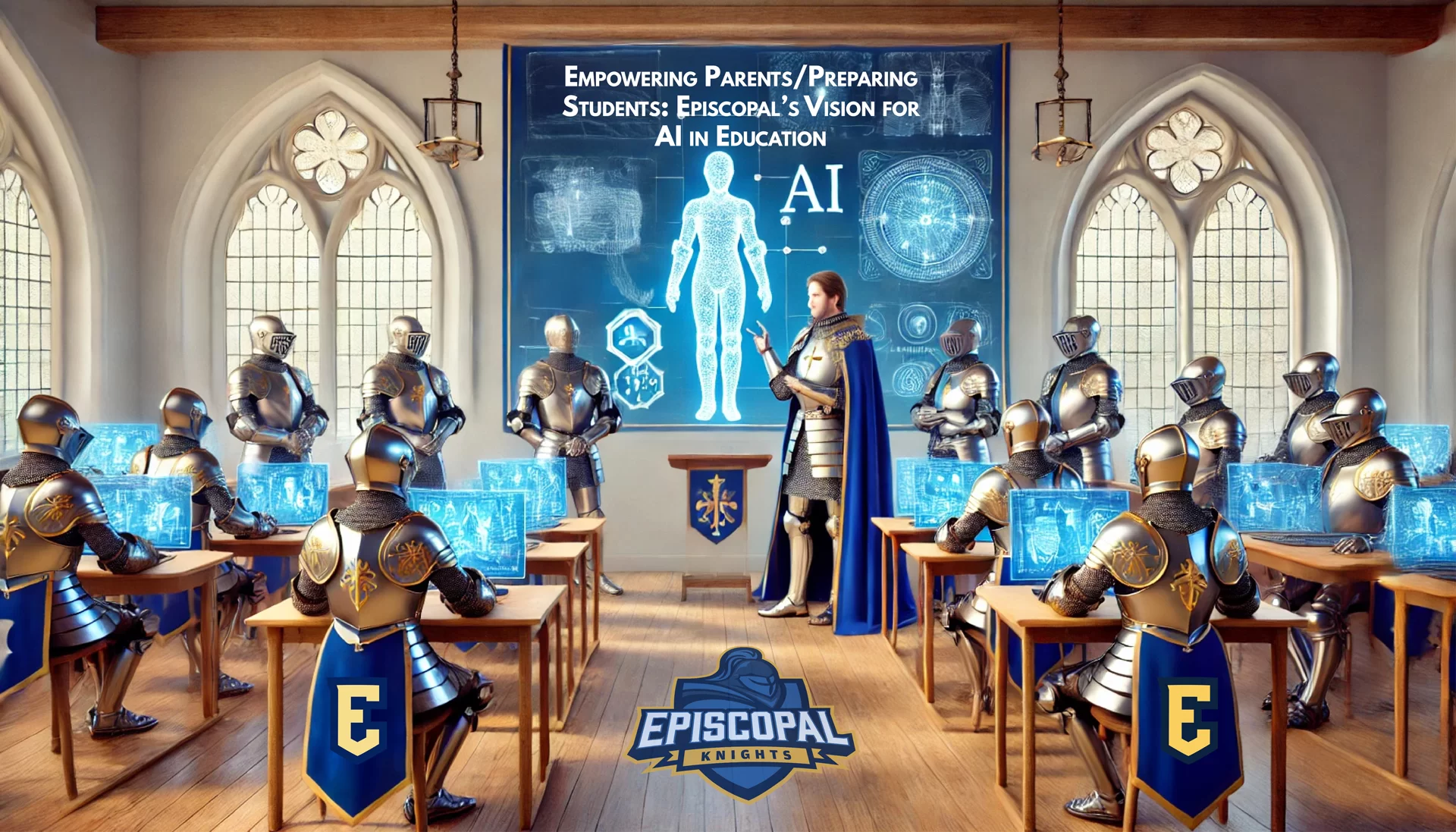- Admission
- Discover Episcopal
- Our Program
- Athletics
- Arts
- Spirituality
- Student Life
- Support Episcopal
- Alumni
- Parent Support
- Knightly News
- Contact Us
- Calendar
- School Store
- Lunch Menu
« Back
Empowering Parents/Preparing Students: Episcopal’s Vision for AI in Education
December 4th, 2024
 Photo generated using ChatGPT and Photoshop
Photo generated using ChatGPT and Photoshop
Natural language processing. Hallucinations. Bias. These are just a few of the artificial intelligence terms Episcopal parents learned in the Middle/Upper School AI-focused parent coffee. The informational event was hosted by Head of School Dr. Carrie Steakley, IT Director Michelle Chenevert, Academic Technology Coordinator Brandi Bergeron and Assistant Head of School for Academic Affairs Dr. Sara Fenske. “The purpose of the event was to help our parents understand what AI is and how we’re approaching AI with our students,” says Dr. Fenske.
As lifelong learners, Episcopal administrators have dedicated considerable time to researching and learning about artificial intelligence and its implications in a school setting. Members of the IT department participated in numerous webinars and attended national conferences. “Technology today, and especially Artificial Intelligence, is changing at a rapid pace,” says Chenevert. “It is important for our technology department to stay ahead of emerging trends. We take the knowledge we gain from national conferences and share them with our faculty and staff through professional development training with our summer Flip Flop PD, during the year at division meetings, or one-on-one sessions with teachers.”
Episcopal’s AI Philosophy
With input from a faculty committee, Episcopal administrators established an AI philosophy that focuses on instilling within students the ability to learn, reason, think critically and be creative. Dr. Fenske points out that humans are much better than AI platforms at these abilities and teaching these skills has been Episcopal’s focus for 60 years now.
Episcopal is also dedicated to preparing students for lives of purpose and meaning, which includes preparing them for an evolving work and technology climate. Administrators considered this when approaching artificial intelligence. “Because AI is so ubiquitous, we don’t have a choice about whether it will affect teaching and learning. We cannot ban it,” says Dr. Fenske. “Instead we need to teach students how to use it appropriately and ethically.” Teaching students to use this new technology means preparing educators for AI in the classroom. Dr. Fenske says teachers must be very clear on when AI is allowed and the purpose of the assignment. To make this easy to understand for students, they’ve adopted a traffic light image with a green light meaning AI use is encouraged, yellow meaning permission must be obtained and a red light meaning AI use is not permitted. Dr. Fenske says teachers think about the purpose of each assignment and ensure students show their ideas and thought processes throughout the journey of learning rather than simply looking at the finished product. Asking students to incorporate personal context into assignments also ensures that students see how the work is relevant to them, not something that can be produced by AI.
For six decades, the Episcopal Honor Code has served as a guidepost in determining appropriate student behavior, and the same is true regarding AI violations. Just as plagiarism is a code of conduct violation, deploying AI without permission is also a violation.
Collaboration Along the AI Journey
The recent parent coffee was an opportunity for parents to learn more about the school’s approach to AI and AI in general. The technology team demonstrated several AI tools to provide parents with a better understanding of what students are doing and how AI can be used. “Being part of your child’s educational experience is vital to home/school collaboration,” says Bergeron. “Educating our parents on artificial intelligence empowers them to understand how amazing AI tools are and how they can enhance their child’s learning process.” Parents were also reassured about Episcopal’s commitment to protecting student privacy and adhering to age recommendations.
This proactive approach to the latest technology showcases the collaborative nature of the Episcopal faculty/staff. Inviting parents to learn more extends that collaboration and benefits students. In addition, Episcopal’s small class sizes make it possible for educators to take the time needed to create thoughtful assignments that prepare students for the ever-evolving world of technology. Dr. Fenske and the IT team hope to offer expertise to other area schools as they continue the artificial intelligence journey.
Today’s students may fill jobs that do not currently exist. Part of preparing students for purposeful lives means preparing them for possibilities. Episcopal has done this well for some time and will continue to do so for the next generation.
The Episcopal School of Baton Rouge 2025-2026 application is now available! For more information on the application process, to schedule a tour, or learn more about the private school, contact us at [email protected] or 225-755-2685.
Other articles to consider
 Sep11A Tradition of Faith and Community: The Fourth Grade Bible Blessing
Sep11A Tradition of Faith and Community: The Fourth Grade Bible BlessingLower School celebrated a milestone as fourth grade students received new Bibles.
See Details Sep11Introducing the Class of 2026 National Merit Semifinalists and Commended Scholars!
Sep11Introducing the Class of 2026 National Merit Semifinalists and Commended Scholars!Introducing the Class of 2026 National Merit Semifinalists and Commended Scholars!
See Details Sep5Building Community through Chess
Sep5Building Community through ChessMembers of the Middle School Chess Club describe it as a fun opportunity to become a better chess player. Read more about this club that has recently experienced tremendous growth.
See Details Sep4Finding Joy and Community in New Experiences
Sep4Finding Joy and Community in New ExperiencesCarrie Poynot challenges others not to fear failure and to find joy in trying new things. Read her recent Upper School Chapel message.
See Details
Categories
- All
- Admission
- Athletics
- College Bound 2019
- College Bound 2020
- College Bound 2021
- College Bound 2022
- College Bound 2023
- College Bound 2024
- College Bound 2025
- Counselors Corner
- Episcopal Alumni
- Giving
- Head Of School
- Lower School
- Middle School
- Spirituality And Service
- Student Work
- The Teachers' Lounge
- Upper School
- Visual And Performing Arts
Recent Articles
- 09/11/25A Tradition of Faith and Community: The Fourth Grade Bible Blessing
- 09/11/25Introducing the Class of 2026 National Merit Semifinalists and Commended Scholars!
- 09/5/25Building Community through Chess
- 09/4/25Finding Joy and Community in New Experiences
- 08/28/25Beyond Numbers: Bringing Social/Emotional Learning into Middle School Math
- 08/28/25Pursue Excellence: The Center for Excellence in Teaching & Learning











